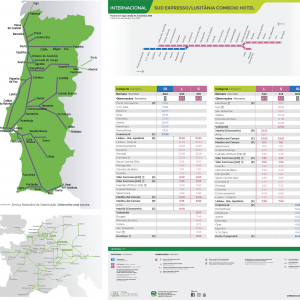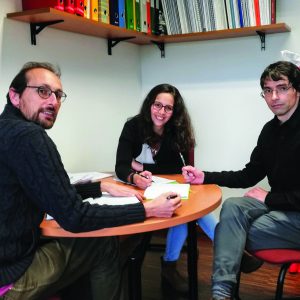This year, a tremendous expansion of airports and air traffic was agreed in Lisbon. Transport – and more specifically aviation – is the sector that most contributes to the greenhouse effect. But we live on the threshold of a transformation. Do we want to travel by plane tomorrow? A story told between Sweden and Lisbon.

Alexandre Seguro is 17 years old. On 25 July, he will sit the national maths exam, his last challenge in secondary education. Four days later, he will participate in the World Peace Conference in Stockholm, Sweden. The choice of transport was obvious to him: “I have time between the 25th and the 29th, so I can go by train. It’s a more sustainable and more enjoyable travel option. This way I can explore more of Europe and enjoy visiting a friend in Switzerland,” he says enthusiastically.
Miriam Thorpe has just made the journey in the opposite direction. She lives in Sweden and crossed the continent to come to a Portuguese friend’s wedding in Tomar. “I saw that it took only two days by train and that it could make my journey more of an adventure,” she explains, as we walk along the banks of the river Zêzere on the eve of her return to Scandinavia.
“The journey was very simple. Stockholm, Copenhagen, Hamburg, Paris, Hendaye, and finally a night train to Lisbon. I was able to meet lots of interesting people, like an English girl who was coming to Lisbon for a conference and only travels by train. We talked about how it’s so much better to look out of the window and travel across national parks in Spain … and it was much easier to sleep than I had imagined. It has inspired me to do this more often.”
Up to now, Miriam has been doing the same as any other person in Sweden. “It’s a cold, dark country and it’s very common for people to fly to sunnier places. You go to Thailand in the winter. In September you go somewhere in Europe, and you go to Amsterdam for the weekend…” Swedes travel by plane five times more than the world average.

This year, everything changed. “My boyfriend and I decided that we weren’t going to fly in 2019,” says the young student-worker. And they’re far from being the only ones. Tools like travelandclimate.org allow you to easily calculate the impact of a trip on climate change. They can even do without the car, animal and industrial products, and buying gadgets. But on one long-haul return flight they waste everything they’ve done for a year in terms of emission savings. “My biggest source of emissions was the plane,” confirms Miriam. “We’re more aware and we have more facts today. People have started thinking about this more; they talk about it on the television. And there are groups where people talk together.”
“Flygskam” (flight shame) has spread throughout the country. “People are ashamed to admit that they fly. I feel this a bit. You realise that you are very privileged. Compared to other countries, what I consume and the way I eat is completely disproportionate.”
According to the European Environment Agency, a train journey emits on average 14 grams of carbon dioxide into the atmosphere per km. A flight? 285 grams. While less than 10% of the world’s population has ever boarded a plane, it’s mostly those who don’t use air transport who are affected by the climate crisis and airport expansion.
#StayOnTheGround and the Flight Free 2020 campaign have also spread across Swedish social media. The challenge? A person pledges to stay on the ground for the whole of the next year – as long as 100,000 other Swedes promise to do the same. “We can take collective responsibility to reduce our emissions and show the world that we are prepared to change our way of life, by doing what it takes to resolve the climate crisis.”
Helsingborg Concert Hall in the south of Sweden has announced that it will only feature performers who don’t travel by plane. 250 celebrities from the film world have come together to demand that the Swedish film industry changes its production methods, reducing the need for flights.
The movement is already having an impact: last winter, train reservations rose by more than 20% and €5 million is being invested in the creation of night trains to the major European cities.
The Flight Free 2020 campaign has since been extended to Belgium, France, Denmark and the United Kingdom. In the United States, the Flying Less campaign has also been working on reducing the use of planes by academics since 2015.
“Flying has become a very common thing, but it’s a luxury and it leaves a large ecological footprint on the planet,” explains Alexandre. “We have to use planes responsibly: only when strictly necessary, or never.”
Look at the planes
“I want you to panic. And then I want you to act. I want you to act as if your house was on fire. Because it is.”
In January, Greta Thunberg, aged 16, travelled for 32 hours by train from Sweden to the World Economic Forum in Davos, Switzerland. The words she addressed to the world’s most powerful people, who had come there to speak about and decide on climate change (using a record number of 1,500 private jets), may make history.
“Resolving the climate crisis is the greatest and most complex challenge that Homo sapiens has ever faced. The main solution, however, is so simple that even a small child can understand it. We have to stop emissions of greenhouse gases. Either we do that, or we don’t. “
In Portugal, less than two weeks before Greta’s speech, the Minister of Planning and Infrastructure, Pedro Marques, the Prime Minister, António Costa, and the multinational company Vinci (who bought the public company ANA Aeroportos), met at Air Base No. 6 in Montijo. They signed a contract for the construction of a new airport in Montijo and the expansion of Portela Airport, thus almost doubling the number of planes flying to the city per hour – from 38 to 72.

Pressing ahead with the expansion of Portela Airport would make it “one of the ten biggest airports in Europe,” says Pedro Nunes, a researcher in Energy and Environment at the Instituto Dom Luiz – University of Lisbon. The total area of the airport, which is the largest source of pollution and noise in Lisbon, would be increased by about a third, allowing it to park 28 more planes; it could start receiving the largest planes in the world and would have about 50% more passengers. All this without even having to carry out an Environmental Impact Assessment.
A new airport in Montijo, located at the present-day military base and aimed at low-cost flights, would be a threat to the ecosystem of the Tagus Estuary (a Nature Reserve) and the quality of life of thousands of people. After the first Environmental Impact Assessment was destroyed by the authorities in charge before being published, a second study is now being made.
“Together, the two airports will become a mega airport structure. It will cause a great increase of emissions in the sector of about 40%,” says Pedro Nunes. “It goes against all that’s required today in the field of climate change and greenhouse gas moderation.” But the actual scenario is even worse. “The same amount of emissions, when made in the troposphere, have double the greenhouse effect that they have when they occur on the surface.”
The bulk of the cost to the climate could be taken care of through taxes. But, unlike cars and lorries, “airlines have never paid a penny of excise duty on fuel at European airports,” says the association ZERO, based on a study prepared for the European Commission in 2018.
In Portugal, fuel for planes (kerosene or aviation-fuel) and airline tickets are not subject to any taxation. This tax exemption makes it possible for fuel to be cheap and has helped to increase the sale of low-cost airline tickets, which, in just a few years, have made air travel an increasingly recurrent habit.
ZERO argues that, if kerosene were subjected to a minimum tax, this would reduce aviation emissions by 11% – equivalent to removing more than 200 thousand cars from Portuguese roads. It would have no impact on jobs or the economy and would allow the government to raise almost €500 million a year. In one year, it would receive more than the total cost of building a new airport in Montijo.
“This is the moment for European ministers to wake up to this reality and put an end to tax evasion in one of the fastest growing areas of carbon emissions,” the association has stated.
Transport is the largest source of greenhouse gas emissions in Europe, accounting for almost 30% of total emissions. CO2 emissions from European aviation have increased by 26% in the last five years. In Portugal, in the last year alone, fuel consumption in aviation and its emissions rose by 7%.
“About 16% of the air traffic in Lisbon is internal traffic, which means it takes place within the country, and it can be perfectly well replaced by trains,” Pedro Nunes suggests. “The remaining traffic could also be replaced by international train travel.”
The train whistle is blowing
At the end of May, the government signed a contract for building the last section of the future South International Corridor. The railway will connect the port of Sines to the border with Spain at Caia (Elvas). It is primarily intended to be used for freight, but it will also be suitable for transporting passengers.
This is one of the projects of Ferrovia 2020, an ambitious programme that seeks to modernise the Portuguese railways by 2020. It is backed by European funds and will completely turn around railway investment, which has been in free-fall since 2011.
Earlier this year, the Público newspaper published a progress report on the extent of the programme’s implementation. So far, of the €2.7 billion announced, spending on ongoing investments amounts to only €158 million. Of the 20 projects announced, eight were supposed to be completed by now and 11 should currently be in the process of being implemented. None of them were completed and there were only six actually under construction. Interventions were planned on 1,193 kilometres of railway, with the construction of a new line of 214 km and the modernisation of 979 km of track. Of these, only 166 km are being modernised. Of the new line, zero.
The government has completed only 9% of the programme.
“The poor execution of the railway investment plan contrasts with the government’s strenuous activity to promote the little work actually in progress,” according to Público. The most illustrative example happened in November. Pedro Marques travelled on an electric train between Nine and Barcelos to show that electrification was going ahead on that stretch. In fact, the high-voltage cable for the railway was connected on that day expressly for the train that the Minister of Planning and Infrastructure was travelling on, and it had been switched off by the end of the afternoon. And it has remained disconnected ever since.
Pedro Marques is now a Member of the European Parliament, after heading the list that won most votes in the European elections, cast by the minority of Portuguese who decided to turn out and vote.
With the delays in Ferrovia 2020 and the lines yet to be electrified, the Portuguese railway company (CP) was forced to rent four more Spanish railcars. The company is also waiting for the government’s permission to hire another 88 workers, a figure that doesn’t even cover the number of workers who have left.
In recent months, there have been several breakdowns on the railways, partly due to the age of the trains. Some will have travelled more than 650,000 kilometres, the maximum limit before an overhaul, which should begin in the summer. Just as in the past year, this situation may well lead to more cuts in train services (already relatively frequent in the Algarve) on both the western line and the Sintra line. CP has been unavailable for an interview with ECO123 for the last three months. Surely this can’t be because the CP President is afraid of questions put to him by a young journalist?
The disastrous management of the Portuguese railways began in the 1980s, when Cavaco Silva’s government began to invest heavily in motorways and public-private partnerships.
“In terms of cost per passenger/km and ton/km, the railway is very competitive. It’s cheaper than other means of transport. But the great advantage is from the environmental point of view: emissions per passenger/km or ton/km are much lower compared to road or air transport. And it doesn’t produce local emissions, spreading pollution directly over people, like cars,” explains Pedro Nunes.
“I think there’s going to be a big change in the field of carbon taxation. It’s likely that people’s way of thinking will change. The new airport is a project that should force you to stop and rethink.”
“It’s much more expensive to travel by train. There are many people who cannot make that choice. This situation could be changed very quickly if trains were subsidised more than planes,” says Miriam.
For the time being, commercial offers tell us that we can travel long distances more cheaply by plane. The legislation allows for this, and it is only people’s awareness that can change this habit.
At the moment, the journey from Lisbon to Madrid by train takes 10 hrs 15 mins, while it takes 13 hrs and 08 mins to the French border, travelling at an average speed of about 75 km/h over the 925 km distance. Every day the Sud Express leaves from Santa Apolónia at 21.25 and arrives at Hendaye at 11.33 am the following day – if there are no breakdowns.
Alexandre isn’t worried. “I really like traveling by train. I’ve travelled between Lisbon and Covilhã, the scenery is very beautiful. So, I will discover the European landscape. I will be contemplating, writing in my diary, getti
to happen.”
 Eco123 Revista da Economia e Ecologia
Eco123 Revista da Economia e Ecologia

